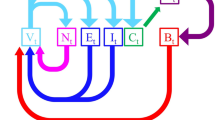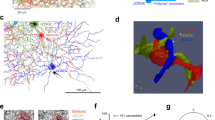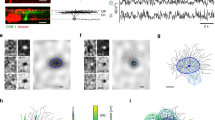Abstract
IN connexion with studies on the experimental phenomenon of spreading depression1, the histological structure of the chick retina is being examined in detail in our laboratory. One of the techniques used proved very suitable for observation of cell processes in the inner plexiform layer. Some aspects of the pattern of amacrine cell processes were observed which have not hitherto been reported. These aspects are described in the present communication. Cajal's nomenclature2 is used throughout.
This is a preview of subscription content, access via your institution
Access options
Subscribe to this journal
Receive 51 print issues and online access
$199.00 per year
only $3.90 per issue
Buy this article
- Purchase on Springer Link
- Instant access to full article PDF
Prices may be subject to local taxes which are calculated during checkout
Similar content being viewed by others
References
Martins Ferreira, H., and Oliveira Castro, G. de, J. Neurophysiol., 29, 715 (1966).
Cajal, S. R., Histologie du Système Nerveux de L'Homme et des Vertebrés (Instituto Ramon y Cajal, Madrid, 1952).
Van der Loos, H., Dendro-Dendritische Verbindingen in de Schors der Grote Hersen (H. Stam, Haarlem, 1959).
Vrabec, F., Czech. Ophthal., 21, 212 (1965).
Author information
Authors and Affiliations
Rights and permissions
About this article
Cite this article
OLIVEIRA CASTRO, G. Branching Pattern of Amacrine Cell Processes. Nature 212, 832–834 (1966). https://doi.org/10.1038/212832a0
Issue Date:
DOI: https://doi.org/10.1038/212832a0
Comments
By submitting a comment you agree to abide by our Terms and Community Guidelines. If you find something abusive or that does not comply with our terms or guidelines please flag it as inappropriate.



